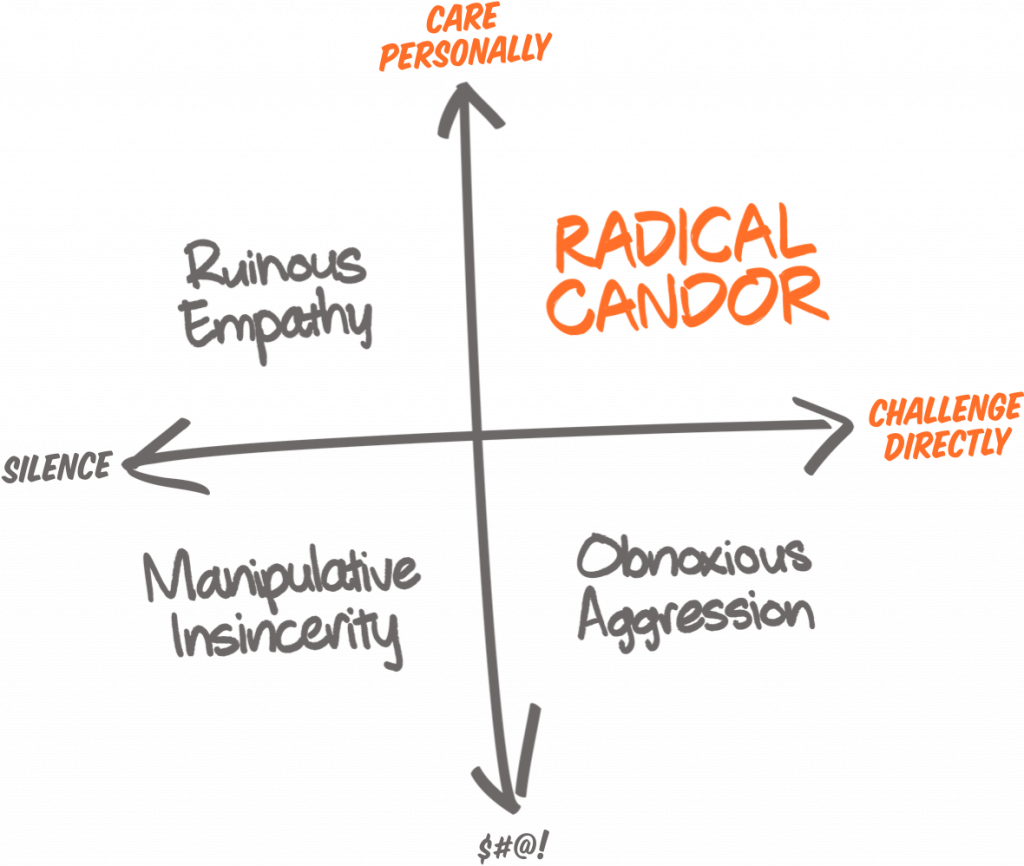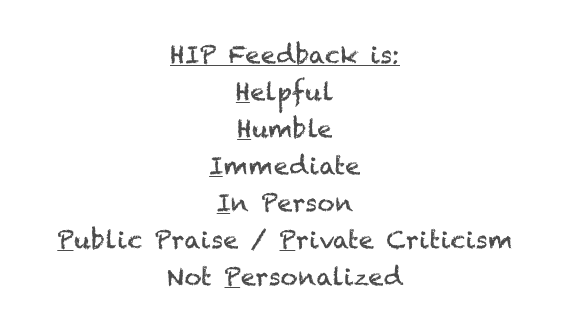What is Radical Candor?
Radical Candor is about more than just “being professional.” It’s about giving a damn about the people you work with, sharing more than just your work self, and encouraging everyone who reports to you to do the same.
It’s not enough to care only about people’s ability to perform a job. To have good relationships, you have to be your whole self and care about each of the people who work for you as a human being. It’s not just business; it is personal, and deeply personal. I call this dimension of Radical Candor “Care Personally.”
Practicing Radical Candor also involves telling people when their work isn’t good enough—and when it is; when they are not going to get that new role they wanted, or when you’re going to hire a new boss “over” them; when the results don’t justify further investment in what they’re working on. Delivering hard feedback, making hard calls about who does what on a team, and holding a high bar for results—isn’t that obviously the job of any manager?
Of course it is, but most people struggle with doing these things. Challenging people generally pisses them off, and at first that doesn’t seem like a good way to build a relationship or to show that you “Care Personally.” And yet challenging people is often the best way to show them that you care when you’re the boss. This dimension I call “Challenge Directly.”
Radical Candor is what happens when you put “Care Personally” and “Challenge Directly” together. Radical Candor builds trust and opens the door for the kind of communication that helps you achieve the results you’re aiming for.
It turns out that when people trust you and believe you care about them, they are much more likely to accept and act on your praise and criticism; tell you what they really think about what you are doing well and, more importantly, not doing so well; engage in this same behavior with one another, meaning less pushing the rock up the hill again and again; embrace their role on the team; and focus on getting results.
So, how can you deliver guidance and feedback to your direct reports without sounding patronizing? The answer is simple, but it’s not easy.

1. Get Feedback Before You Give It
While some bosses consider themselves beyond reproach, this kind of one-way-street thinking won’t help you build trust with your direct reports. The best way to make your team more receptive to receiving feedback is to ask them to give it to you first. Being the boss doesn’t mean you automatically get respect from people, but the authority does have an automatic impact on what people will say to you. Unfortunately, people are primed to mistrust you based on all the preconceived notions against bosses.
Your direct reports may be reluctant to give you honest feedback at first, but if you lead by example, eventually you’ll see results. As the boss, you’ll tend to get more flattery, and it may be false flattery. You’ll need to hone your BS meter to know when to dig deeper to get candid feedback.
Remember, it is crucially important for you to get feedback and find out what people really think. Getting people to challenge you directly can be the difference between success and failure, which means you need to make a concerted effort to get feedback. Start by asking your team to criticize you because fishing for praise will just thicken the bank of BS flattery that’s likely to come rolling at you as the boss like a dangerous fog.
Nicholas Miller, co-founder and CEO of Gather, a company creating event management software for restaurants and other venues, shared with me how he got one of his direct reports to become more comfortable with giving and receiving feedback by asking for it first.
“I noticed a new direct report of mine didn’t seem to love getting direct feedback from me. To create an open relationship, I asked him to share feedback on how I was doing after every single meeting we were both a part of, including one-on-ones, and then actively solicited it. Slowly, the dialogue evolved into two-way feedback. Now we have more frequent and explicit conversations about feedback than I do with any of my other direct reports!”
In general, I recommend two guidelines for how to get others to give you honest feedback:
Be persistent
Convince your team you really do want to hear what they really think. Show them that your requests for criticism are genuine and that you sincerely appreciate it when they say what they think. Keep asking for criticism regularly. Try different approaches, venues, and situations. Whatever you do, don’t accept an environment where you aren’t getting the feedback you need to be successful.
Reward the candor
It’s not enough to appreciate critique from your team, or not to get defensive. You have to reward the candor. People need to see and feel that there is a benefit to criticizing you. While it may take time for people to build up enough courage to give difficult feedback, reward small wins along the way.
For example, one time I asked for feedback and received silence, but eventually one person spoke up. It wasn’t much, frankly—a complaint about the tea in the office—but I rewarded the candor handsomely. I thanked the person publicly, I sent a handwritten note, I approved funds to make sure there was better tea, and I made sure everyone knew that there was better tea now because somebody had complained about it in the meeting. Later, more substantive issues got raised.
2. Remember: Radical Candor is HIP
Once you’re ready to offer feedback to others, it’s important to remember that radically candid feedback is specific and sincere, and kind and clear. The best way to ensure you’re delivering this type of feedback is to remember that Radical Candor is HIP: Humble, Helpful, Immediate, In person, Private criticism / Public praise, and Not about Personality.
Humble
Don’t be arrogant. Be curious. Deliver your feedback firmly and with supporting rationale, but be open to push-back. Listen with true intent to understand so that you get a full command of both perspectives before agreeing or disagreeing.
Helpful
You don’t have to have all the answers. Simply exposing your intent to be helpful offers clarity to the other person about your intentions. Most people will want to hear whatever it is you’re going to say.
Immediate
Feedback has a short half life. When you give feedback while the details are all fresh in your mind, you are able to be much more specific. You also give the person a better chance to improve immediately.
In Person
The clarity of your feedback gets measured not at your mouth, but at the other person’s ear. The majority of communication is non-verbal, and you won’t really know if the other person understood what you were saying if you can’t see the reaction. When talking in person, you can make adjustments based on their body language and emotions. If you work with a remote team, opt for a video call so you can still communicate face to face.
Private Criticism / Public Praise
A good rule of thumb for feedback is praise in public, criticize in private. Public criticism tends to trigger a defensive reaction and make it much harder for a person to accept they’ve made a mistake and learn from it. Public praise tends to make the recipient feel great, and it encourages others to emulate whatever they did that was great.
Not About Personality
Make your feedback about the work the person has done, rather than about the person. “I think that’s wrong” is more effective than “You’re wrong.” And “That was a great presentation because X, Y, Z” is more beneficial than “You’re great at presentations!”
People can’t alter their personalities, so saying things like “You’re a jerk” or “You’re sloppy” is neither kind nor does it provide specifics to make the direct challenge clear. Saying “you’re a genius” when somebody does great work also has an unspoken, dangerous corollary: if the work is bad, “you’re a bloviating buffoon” (or maybe more commonly, “you’re a dummy”). The result of personalizing somebody’s work and calling them either a dummy or a genius is that they quit taking risks, quit learning, and quit growing.
Saying that good feedback doesn’t personalize isn’t the same as saying that it isn’t personal. When you give feedback, it’s best to focus on the specifics of the work, not the person’s attributes.
Personalizing feedback clouds both the other person’s thinking and your own. It clouds the other person’s thinking because if the problem actually is that the person is a dummy, then there’s nothing they can do about it. If that isn’t the problem, then they’re unjustly accused.
Name calling clouds your thinking because when you indulge in it, you are generally falling prey to the fundamental attribution error. This is the tendency for people to use personality attributes to explain someone else’s behavior rather than considering their own behavior or situational factors that were probably the real cause of the behavior.
This makes personalized feedback a problem because it’s inaccurate and renders an otherwise solvable problem unsolvable. It’s usually easy to change one’s own behavior and situational factors, but almost impossible to change core personality attributes.
Avoid the fundamental attribution error by focusing on specifics, not attributes. Instead of saying (or thinking) “What a dummy,” be very clear about what went wrong. Focus on helping the person correct the problem by providing specifics they can act on rather than criticizing personality traits they can’t alter.

3. Think Before You Speak
Before you offer praise or criticism, do these three things. Get clear in your own mind about how you intend to help, share your intention to be helpful, and offer helpful context. This will reduce your chances of engaging in feedback fails.
- Before you deliver feedback to a direct report, take a moment to think through the reason why you plan to deliver the feedback. If you are clear in your own mind about how your feedback will be helpful, it will come across to the other person naturally. But if you don’t understand why your feedback is helpful, how will the person receiving it?
- Once you know what you want to say and why, state your intention to be helpful. Perhaps the simplest advice I have to give here is for you to tell the person that you are trying to be helpful. Try a little preamble for hard criticism. For example, try saying, in words that feel like you, “I’m going to tell you something because if I were in your shoes I’d want to know so I could fix it.” Simply exposing your intent to be helpful offers clarity to the other person about your intentions. Most people will want to hear whatever it is you’re going to say.
- Show, don’t tell is the best advice I’ve ever gotten for writing good fiction—but it also applies to feedback. The more clearly you show what is good or bad, the more helpful your feedback will be. Often you’ll be tempted not to describe the details because they are so painful. You want to spare the person the pain and yourself the awkwardness of uttering the words out loud.
Being precise can feel awkward. For example, I once had to say, “When we were in that meeting and you passed a note to Catherine that said ‘Check out Elliot picking his nose–I think he just nicked his brain,’ Elliot wound up seeing it. It pissed him off unnecessarily, made it harder for you to work together, and was the single biggest contributing factor to our being late on this project.”
It was tempting just to say, “Your note was childish and obnoxious.” But that wouldn’t have been as clear or as helpful.
The same principle goes for praise. Don’t say, “She is really smart.” Say, “She just solved a problem that no mathematician in history has ever been able to solve,” or “She just gave the clearest explanation I’ve ever heard of why users don’t like that feature.”
By showing rather than telling what was good or what was bad, you are helping a person to do more of what’s good and less of what’s bad, and to see the difference.
4. Manage Your Emotions, Not The Other Person’s
When you’re delivering difficult feedback, even in a caring way, people are likely to get emotional. That’s OK. While you might be tempted to deliver feedback you know will elicit strong emotions in email, chat, or on the phone to avoid awkwardness, in-person conversations are best for two big reasons. (If your team is remote, video is the next best option to an in-person conversation.)
- The clarity of your feedback gets measured not at your mouth, but at the other person’s ear. So if you can’t see the reaction, you won’t really know if the other person understood what you were saying. If you don’t know whether what you said was clear to the other person, you may as well not have said it.
- Most of communication is nonverbal. When you see a person’s body language and facial expression, you can adjust how you are delivering the message so they can best hear it. The best way to tell if the other person understands you clearly is to look into their eyes, notice if they are fidgeting, folding their arms, etc.
Often, the reason people don’t deliver guidance in person is that it’s awkward. They are trying to avoid seeing the other person’s emotional reaction. They don’t want to deal with tears, yelling, scoffing, or any other negative reaction. Don’t hide behind chat, email, or other software to avoid negative emotional reactions to feedback.
You can’t control another person’s emotional reaction, but that doesn’t mean you should try to avoid it. You’ve got to be present for these emotions. You can use them to better understand how your message landed, and to adjust. But don’t let the emotions knock you off your good intention to Challenge Directly. Acknowledge the person’s emotions, and don’t get defensive. Everyone has a right to their emotions.
Emotional reactions can offer important clues to help you better understand what’s really going on with the people you manage. They can offer you a shortcut to the heart of the matter. So don’t respond to outbursts or sullen silences by pretending they are not happening. Don’t try to mitigate them by saying things like, “It’s not personal,” or “Let’s be professional.” Instead say, “I can see you’re mad / frustrated / elated.”
In addition, when planning a difficult conversation, try taking a walk instead of sitting and talking. When you’re walking, the emotions are less on display and less likely to start resonating in a destructive way. Also, walking and looking in the same direction often feels more collaborative than sitting across a table and staring each other down.

5. Have Regular Career and Professional Development Conversations With Direct Reports
Each individual person is on their own growth trajectory. And as a boss, it’s a mistake to push everyone in the same direction. To be successful, you need to balance growth and stability, and the only way to do this is to take the time to establish real relationships with the people who report to you and have regular career and performance development conversations.
If you neglect to do this, your direct reports are more likely to not only be disengaged, but feel more blindsided by feedback, which means they’re less likely to truly hear it.
Career conversations will guide you through career planning with your direct reports so you can learn what is important to them, understand where they want to go and work collaboratively with them to build the best possible plan of action to benefit each individual person as well as the team as a whole.
Only when you get to know your direct reports well enough to know why they care about their work, what they hope to get out of their careers and where they are in the present moment in time, can you put the right people in the right roles and assign the right projects to the right people.
As a manager, it’s also your job to help each person on your team both develop and grow their careers. Impromptu performance development conversations should be happening multiple times a week and should be focused on coaching a person to do more of what’s good and less of what’s not. Giving guidance that’s kind, clear, specific, and sincere is the cornerstone of performance development.
The atomic building block of Radical Candor is the two-minute impromptu development conversation. The motivation to solicit guidance and to act on it is the desire to improve, to grow, to do good work and then make it better, to build strong relationships and then make them stronger.
“I’m listening to you because I want to develop the skills and the team I’ll need to succeed.”
The motivation to give guidance is mostly altruistic—to help another person and the team as a collective flourish.
“I’m telling you this because I want to help you develop the skills you need to succeed and because it’s not fair to your peers if I don’t tell you.”
Overall, the best way to give feedback like a boss is to remember that in order to be truly effective you have to commit to caring personally and challenging directly.
Doing one without the other, or doing neither, means you’re being obnoxiously aggressive, manipulatively insincere, or ruinously empathetic. These behaviors not only increase feedback fails, they erode trust between you and your team. And lack of trust leads to high turnover, low morale, poor performance, and can even affect revenue.
Learn more about career and performance development conversations:
Why You Can’t Skimp On Radically Candid Performance Development Conversations
How To Have Radically Candid Career Conversations Like a Boss
The Problem with Career Conversations Today
A version of this article by Kim Scott, the author of the New York Times and Wall Street Journal bestseller Radical Candor: Be a Kick-Ass Boss without Losing your Humanity and the co-founder of Radical Candor LLC, appeared on Deliberate Directions.
Improvising Radical Candor is a co-production of Radical Candor, LLC and Second City Works. By exercising Radical Candor through improvisation, teams learn the art of giving and receiving feedback while developing core improv fundamentals that emphasize skills like active listening, staying present and being others-focused. Want to learn more? Get The Feedback Loop, our workplace comedy series and supporting learning materials, starting at $59 for our self-paced e-course.

